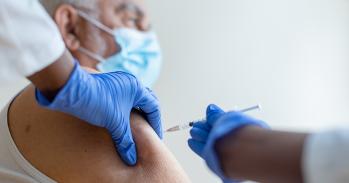
Ben Underwood’s expertise in delivering clinical trials became highly prized last year, as he worked on a vaccine trial the whole world was watching.
Ben Underwood’s expertise in delivering clinical trials became highly prized last year, as he worked on a vaccine trial the whole world was watching.
Like many clinical researchers, my latest work has focused on urgent public health studies in response to the pandemic. Normally I have three roles: as a Consultant Psychiatrist and Deputy Medical Director at Cambridgeshire and Peterborough NHS Foundation Trust (CPFT), Clinical Director of CPFT’s Windsor Research Unit in Fulbourn, and Dementia Lead for the National Institute for Health Research (NIHR) Clinical Research Network Eastern. Most of my research until recently has been in dementia, and in particular trialling potential treatments with the Gnodde Goldman Sachs Translational Neuroscience Unit. I still do that, but 2020 has also thrown me into the world of viral pandemics in a completely unexpected way.
The Windsor Research Unit team and I are supporting delivery of coronavirus vaccine trials in Cambridge, including the Oxford/AstraZeneca (ChAdOx) vaccine. The way that CPFT, the University, NIHR Cambridge Clinical Research Facility, Cambridge University Hospitals NHS Foundation Trust (CUH) and Royal Papworth Hospital NHS Foundation Trust (RPH) pulled together to rapidly deliver a vaccine trial was extraordinary to see, and an honour to be part of. It’s a milestone partnership for research in this region, and we are lucky to have the support and infrastructure of the NIHR across the UK.
We couldn’t have hoped for a better result in terms of overall vaccine efficacy, and I'm delighted to hear the vaccine has now been approved for use. The fact we had such a clear and important goal really galvanised us and there was a great spirit in the team. There are too many people to name for their outstanding efforts, and this research would not have been possible without the entire team behind it, and all the health and care workers across Cambridgeshire and Peterborough who volunteered. I cannot thank everyone involved enough! I hope I have made new friendships that endure, and I have such great respect for many of the people involved.
The next challenge is delivering effective vaccines to a global population as quickly as possible. The creation and testing of COVID-19 vaccines within a year has been one of the greatest scientific and medical achievements of our time, made possible through new partnerships, with researchers all over the world working together and sharing data. We need to get effective vaccines out to people as soon as they are approved, starting with the most vulnerable and at risk.
The pandemic has posed crucial questions for our clinical services. My team also collaborated to publish papers addressing some of these including: the role of community services in dealing with COVID-19, the impact of the virus on community and mental health services and the risk factors for mortality, the provision of memory assessments during the pandemic, and mathematical modelling of rates of spread in community healthcare settings.
We must now question whether we have got the balance of governance and delivery right on clinical trials. We have demonstrated that we can safely and accurately deliver trials in a year - this previously might have taken ten years, largely due to governance processes. How can we capture what we have learned, to deliver clinical trials just as safely in a much shorter timeframe in future?
We have learned so much from this experience, and our research team are now determined to transfer knowledge and skills for testing vaccines into developing new effective treatments for dementia, which is still the leading cause of death in the UK.
When the pandemic is over I just want to lie down with a wet towel over my face! Professionally, I’m looking forward to finding better treatments for dementia. Personally I love playing music in my spare time but haven’t been able to play with others since the pandemic began, so I can’t wait to be back in a band rehearsal room.
Ben Underwood is a Visiting Researcher in the University of Cambridge’s Department of Psychiatry, where he will become University Lecturer in Older People’s Health from April 2021.
How you can support Cambridge’s COVID-19 research

The text in this work is licensed under a Creative Commons Attribution 4.0 International License. Images, including our videos, are Copyright ©University of Cambridge and licensors/contributors as identified. All rights reserved. We make our image and video content available in a number of ways – as here, on our main website under its Terms and conditions, and on a range of channels including social media that permit your use and sharing of our content under their respective Terms.




